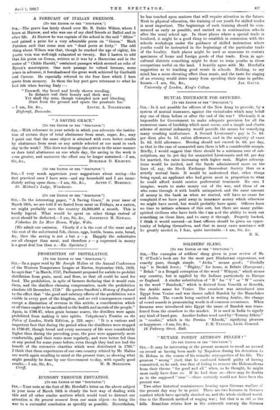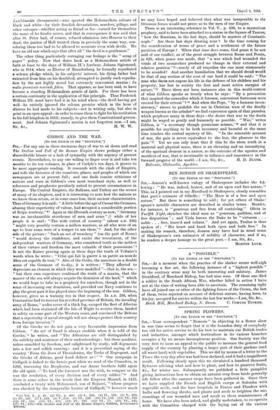" MUTARE POTEST AETHIOPS PELLEM ? " [To THE EDITOR
OF THE " SPECTATOR.1
Sin,—It may be interesting at the present moment to recall an avowal on record as having been made by Napoleon during his detention i St. Helena in the course of his remarks retrospective of his life. The greatest " wrong " (tort) that he confessed himself guilty of having committed, so he said, was that of failing to remove the Hohenzollern's from their throne "for good and all" when, as he thought, he might most easily have done so. If ho had done so—there may be doubts as to the supposed "case "—there certainly would not have been the present war.
Two other historical reminiscences bearing upon German warfare o: the present day may be in point. Thero are two features in Germae conduct which hare specially shocked us, and the whole civilized world. One is the Hunnish method of waging war ; but that is as old as the hills. Brenta= relates how in the sixteenth century the German Lanbknechte (lansguenets)—who sported the Hohenzollern colours of black and white—by their fiendish devastations, murders, pillage, and other outrages—whether acting as friend or foe—earned for themselves the name of ks bander noires, and that in consequence it was said that after St. Peter had, of course, refused admission into Heaven to their dead, the janitor of Hell treated them in precisely the same way, con- sidering them too bad to be allowed to associate even with devils. We have an old saw which says that after all " the devil is a gentleman."
The other thing particularly outraging our feelings is the "scrap of paper" policy. Now that dates back as a Hohenzollern article of faith at least to the days of William II.'s forebear, Johann Sigismund, who in 1614, when as Elector of Brandenburg he formally repudiated a solemn pledge which, in his subjects' interest, his dying father had extracted from him on his deathbed, attempted to justify such repudia- tion by the not highly moral but extremely convenient maxim : In mans promissis rescinds fidem. That appears, as has been said, to have become a standing Hohenzollern article of faith. For there has been a certain continuity in the application of this principle. Thus Frederick William III. must have had it in his mind when—the devil having got well—he entirely ignored the solemn promise which in the hour of distress he had made to his subjects—not in writing only, but also in print in an open appeal—in order to rouse them to fight for his restitution to his full kingdom in 1813; namely, to give them Constitutional govern- ment. And Johann Sigismund's maxim is not forgotten now.—I am,































 Previous page
Previous page